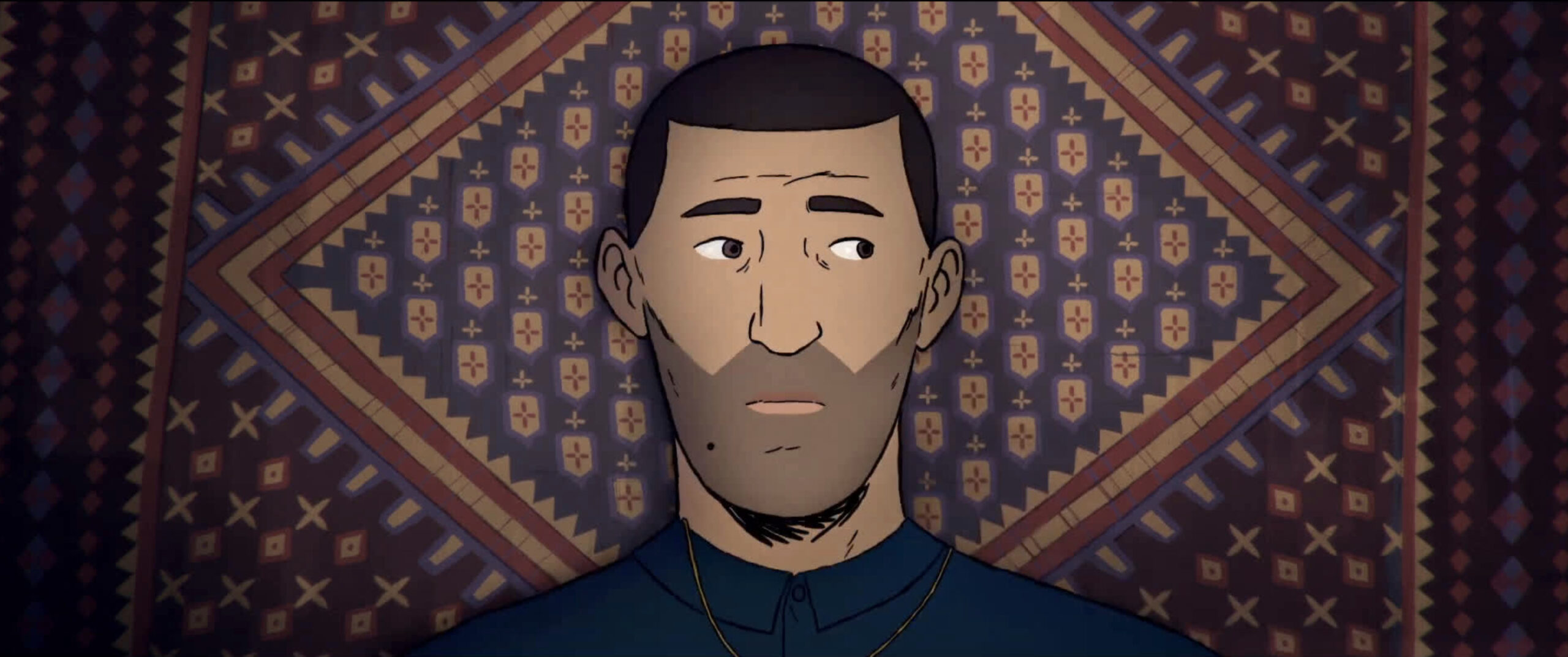
Flee is a documentary that chronicles the boyhood and adolescence of a man named Amin who fled Afghanistan to Russia with his family in the late 1980s and sought asylum in Europe throughout the 1990s. He tells his his story from the present day in Denmark where he eventually landed, and he reflects on how the experience continues to shape his identity and relationships.
Everyone who lives in the relative peace and security of the West should watch Flee. It that reveals the unimaginable hardships refugees face in seeking a place to live where their lives are not in danger. Almost always, these people are refugees because of decisions our nations have made to attempt to secure our own wealth and safety. These situations are always complex, but our actions play an essential role in them.
Flee is mostly animated. This method bridges the present day scenes of Amin being interviewed in Denmark and living with his partner with the recreations of scenes from his childhood. Even if it served no other narrative purpose, it would be an ingenious way to recreate moments from Amin’s past that could not be filmed. They animation also makes ties present day Amin, who lives peacefully in Denmark and the United States where he is working on a post-doctoral fellowship at Princeton, with the vulnerable boy barely surviving with his family on the run in Afghanistan and Russia.
In many ways, that is the story of Flee – the way the experiences of his childhood continue to influence who he is in the present day. The overarching narrative is about how telling this story honestly—something that is difficult to do for both emotional and practical reasons, which we learn about as he tells it—is a necessary step in his process of fully integrating into his present life. It is a process that is far from complete, but there is hope.
It really is unimaginable what people endure in pursuit of safety. I watch films like this and think about my own family. Yes, I want to say I would endure what I see in Flee and anything I had to endure to protect those I love, but it is also necessary for me to admit that I have never faced a hardship as dire as what Amin faced before he was ten years old. I don’t know if I have the fortitude to survive the way he did. Please, God, may I never find out.
But Flee isn’t about me, and while empathy requires me to picture myself in Amin’s shoes, it should not end there. It should push me to loving action on behalf of refugees like him. Amin’s story should linger and cause me to stop and think before I decide what policies to support, who to vote for, what kind of world we are building, we powerful nations who shape the world. At the very least, I should pray. I should pray that my heart will remain soft and that God will bring justice to our world for people like Amin. Thy kingdom come.
Flee is a documentary that chronicles the boyhood and adolescence of a man named Amin who fled Afghanistan to Russia with his family in the late 1980s and sought asylum in Europe throughout the 1990s. He tells his his story from the present day in Denmark where he eventually landed, and he reflects on how the experience continues to shape his identity and relationships.
Everyone who lives in the relative peace and security of the West should watch Flee. It that reveals the unimaginable hardships refugees face in seeking a place to live where their lives are not in danger. Almost always, these people are refugees because of decisions our nations have made to attempt to secure our own wealth and safety. These situations are always complex, but our actions play an essential role in them.
Flee is mostly animated. This method bridges the present day scenes of Amin being interviewed in Denmark and living with his partner with the recreations of scenes from his childhood. Even if it served no other narrative purpose, it would be an ingenious way to recreate moments from Amin’s past that could not be filmed. They animation also makes ties present day Amin, who lives peacefully in Denmark and the United States where he is working on a post-doctoral fellowship at Princeton, with the vulnerable boy barely surviving with his family on the run in Afghanistan and Russia.
In many ways, that is the story of Flee – the way the experiences of his childhood continue to influence who he is in the present day. The overarching narrative is about how telling this story honestly—something that is difficult to do for both emotional and practical reasons, which we learn about as he tells it—is a necessary step in his process of fully integrating into his present life. It is a process that is far from complete, but there is hope.
It really is unimaginable what people endure in pursuit of safety. I watch films like this and think about my own family. Yes, I want to say I would endure what I see in Flee and anything I had to endure to protect those I love, but it is also necessary for me to admit that I have never faced a hardship as dire as what Amin faced before he was ten years old. I don’t know if I have the fortitude to survive the way he did. Please, God, may I never find out.
But Flee isn’t about me, and while empathy requires me to picture myself in Amin’s shoes, it should not end there. It should push me to loving action on behalf of refugees like him. Amin’s story should linger and cause me to stop and think before I decide what policies to support, who to vote for, what kind of world we are building, we powerful nations who shape the world. At the very least, I should pray. I should pray that my heart will remain soft and that God will bring justice to our world for people like Amin. Thy kingdom come.

Elijah Davidson is Co-Director of Brehm Film and Senior Film Critic. Find more of his work at elijahdavidson.com.
Licorice Pizza is like a trip to a record store. It’s a great hangout movie, awash in music and shining with all the adolescent feelings pop music so perfectly captures.